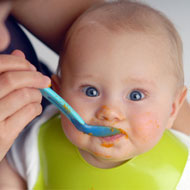Tips & Guidelines For Feeding a Newborn Baby
Feeding your baby in the right manner and with the right kind of foods is very crucial for the development of the child. Here is some baby feeding advice that may be helpful. Breast feeding the child is important for the first few months, as the mother milk contains a lot of nutrients that are required for a child be healthy and strong.
In fact, breast feeding the child even twice a day will contribute largely to a strong and healthy baby. The colostrum that is present in the mother’s milk will help in developing as well as strengthening the child’s immunity, for the first few years of his or her life.
The mother however, will have to ensure that she eats healthy, gets a sufficient amount of rest and abstains from alcohol, cigarettes and medications, as the harmful ingredients contain in these substances can be passed on to the child, through the breast milk. Feeding the child with only breast milk is generally recommended for the first four months after child birth.
Baby Feeding Tips
After about 4-5 months the child can graduate to eating other kinds of food in addition to the mother’s milk. Some of the foods that can be fed to the child include semi solid rice cereals (iron fortified) and other kinds of grain cereals such as barley and oats. You can begin by feeding the child a teaspoon of dry rice cereal that has been mixed with 4 teaspoons of breast milk. The consistency can be progressively increased to a tablespoon of dry rice cereal mixed with 4 teaspoons of breast milk.
After 6 months you can introduce strained or pureed fruits and vegetables in to the child’s diet such as peaches, pears and bananas sweet potatoes, squash, avocadoes and carrots. Whenever you introduce new foods to your child, do it one by one and not all together. It is advisable to keep a gap of three to four days to ensure that your child is not allergic to any particular kind of food.
Once the child is about 8 months of age you can introduce additional food items such as diced bananas, teething crackers, non citrus juices, very small quantities of protein such as boneless fish, poultry, pureed meat, eggs and mashed beans. The child may also be fed small quantities of soft cottage cheese, pasteurized cheese and yogurt. Do not feed the child any cow’s milk products till he or she is a year old.


